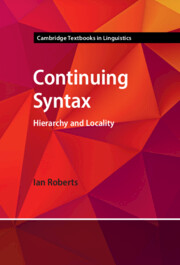Book contents
- Continuing Syntax
- Cambridge Textbooks in Linguistics
- Continuing Syntax
- Copyright page
- Contents
- Preface
- Abbreviations
- Part I Configuration and Hierarchy
- Part II Locality
- 10 Wh-Movement: Unbounded Dependencies, Islands, Subjacency and Barriers
- 11 Covert Movement, Copy Theory and Reconstruction
- 12 Phases and Phase Impenetrability
- 13 Types of Locality: Phases and Relativised Minimality
- 14 The Syntax of Silence I: Ellipsis
- 15 The Syntax of Silence II: Empty Pronouns
- 16 Wrapping up: Parameters, Features and Futures
- Glossary
- Book part
- Index
- References
16 - Wrapping up: Parameters, Features and Futures
from Part II - Locality
Published online by Cambridge University Press: aN Invalid Date NaN
- Continuing Syntax
- Cambridge Textbooks in Linguistics
- Continuing Syntax
- Copyright page
- Contents
- Preface
- Abbreviations
- Part I Configuration and Hierarchy
- Part II Locality
- 10 Wh-Movement: Unbounded Dependencies, Islands, Subjacency and Barriers
- 11 Covert Movement, Copy Theory and Reconstruction
- 12 Phases and Phase Impenetrability
- 13 Types of Locality: Phases and Relativised Minimality
- 14 The Syntax of Silence I: Ellipsis
- 15 The Syntax of Silence II: Empty Pronouns
- 16 Wrapping up: Parameters, Features and Futures
- Glossary
- Book part
- Index
- References
Summary
In this final chapter we look at three main topics. First, we summarise and give an overview of the parameters we have seen in the preceding chapters, to some extent revising them as we go along. Second, we look at the theory of parameters and introduce the notion of parameter hierarchy. Third, we consider some future questions and directions for the theory.
Information
- Type
- Chapter
- Information
- Continuing SyntaxHierarchy and Locality, pp. 304 - 323Publisher: Cambridge University PressPrint publication year: 2025
